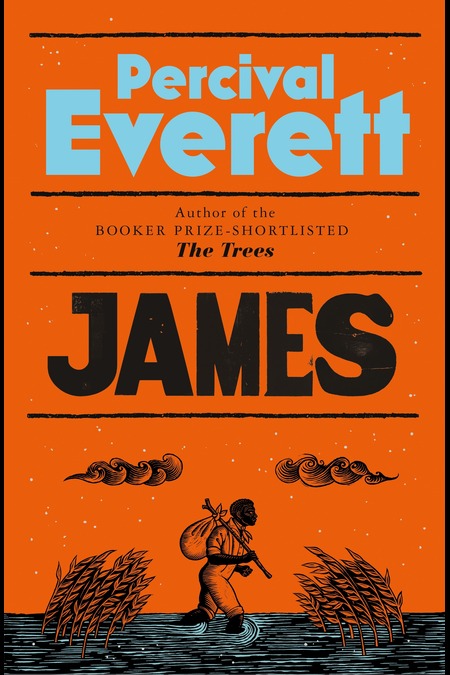(courtesy Pan Macmillan Australia)
When you consider a classic book like Adventures of Huckleberry Finn by Mark Twain, first published in 1884/85, it’s hard to imagine that the much-loved and adapted story could have any new light shone on it.
It’s so well known and it’s lead character so well regarded, that reimagining it in any way, shape or form, would be a fraught exercise indeed.
Quite possibly, but then if you’re acclaimed writer Percival Everett, you find a way to do what looks to be impossible in James by elevating Jim, a man who begins as a friend to the protagonist before becoming a father figure of sorts, and who, observes study.com, though not the central character of the story (though he is the standard bearer for the book’s anti-slavery and anti-racism messaging) becomes “a crucial character to Huck’s moral development and to demonstrate how corrupt society was”.
Now known as James, which is just one hidden element of a man who survives in a robustly unjust society by playing the game the way the white people have set down the rules – so if they insist on calling him Jim, then Jim it is; he may not like it but survivability does not care much for likes, needs or wants unfortunately – James gives us a vividly arresting portrait of a man is far bigger and more complex than the small, bigoted worldview of white people will let him openly be.
One thing was certain: I had to make sure Huck didn’t become the corpse they were looking for. More to the point, I had to make certain I didn’t become the corpse they were looking for.
In Everette’s assured hands, James is such a compellingly protagonistic character that we quickly see Twain’s classic tale in a wholly different way.
Here is a man who though outwardly small and minimised by white society, is more thoughtful, literate, capable and insightful than almost all of the people who think themselves his betters; in fact, James is full to entertainingly bursting with scene after scene where white characters tar themselves with the brush of their own stupidity simply by opening their ill-informed and woefully under-educated mouths.
It’s amusing but also distressing because in these illuminating interactions, where Jim is forced to take on a slave patois which does not reflect his normal mode of speaking at all – being a slave is performative in lots of ways sadly, subsuming who you are in favour of who your self-proclaimed masters think you are; much of the way Jim and his fellow slaves speak and act is to not offend the delicate sensibilities of easily-offended bigots – we know he is far greater a person than any of them will ever be.
He reads and muses upon the likes of Voltaire, converses in his dreams with British philosopher John Locke, writes in a manner that is masterfully literate but richly emotionally accessible and thoughtfully insightful, is selflessly devoted to his wife and daughter and to Huck, a white boy with an abusive father who doesn’t hold to much of the bigotry of his age (though he does need some explaining of why this is bad from James) and he is brilliantly good at assessing situations and thinking and acting his way out of them where others might simply fold and give up.
(courtesy Windham Campbell Prizes)
In James, which takes place in 1861 as the Civil War is just getting started, we have a character who damns an entire society simply by being alive.
As he and Huck set out on an odyssey to save themselves – James to escape being sold to an owner in New Orleans which will separate him from his wife and daughter and Huck to escape a father who may yet kill him – it isn’t obvious that something life-changingly immense will come out of it.
All the two friends want to do is survive, and survive they largely and magnificently do, but not without encountering the kinds of troubles and obstacles that make life in nineteenth century America hell for anyone who’s not white and sitting atop a societal hierarchy which damns far too many people to oppression and a hellish existence.
It’s a manifestly cruel and unjust system no matter how you slice it, and James exposes every last cancerous and broken part simply by giving us a protagonist who is far than what society says he is allowed to be.
James does not care; sure he plays the games with his masters to stay alive and keep his family safe, but his whole existence is bravely and seditiously based upon pursuing and living out who is intrinsically is no matter what may swirl around him.
‘Norman, you should carry this.’ I pulled the leather notebook fro the waist of my trousers. ‘I shouldn’t be seen with it.’ I hated to part with it. I had not torn out Emmett’s songs—somehow they were necessary to my story. But in this notebook I would reconstruct the story I had begun, the story I kept beginning, until I had a story.
For anyone who has had to have two faces just to survive, James is a revelation, a joy and a song of freedom and glorious authenticity.
Everett does not pretend for a second that the life of James is an easy simply because he is secretly and fiercely himself – though there is more openness towards the end of this transformatively brilliant story, James only finds true freedom well out of the world that once enslaved him in more ways than one – but he does sing praises to the fact that no matter what others may think of you that there is real sustaining power in resolutely being yourself no matter what comes against you.
It’s not a simplistic idea and James does pay for it, but his commitment to being authentically himself where he can be keeps him going, and saves him and Huck in ways that go well beyond the purely physical.
In the beautifully written and emotionally rich storyline of James, we see one man elevate what was hidden into something that defines him more and more openly as he defies convention, fights the system and takes power back from those who are clearly lesser than and never really deserved it in the first place.
James is clearly the better man in every instance, and as James progresses and comes to a liberatingly propulsive conclusion, we see that again and again, that what the status quo may deem to be the case is often far from what it really is and that though it costs you a great deal to fight it and be yourself, that there is much sustaining and changing power in doing that and changing not just your circumstance but that of those around you.

